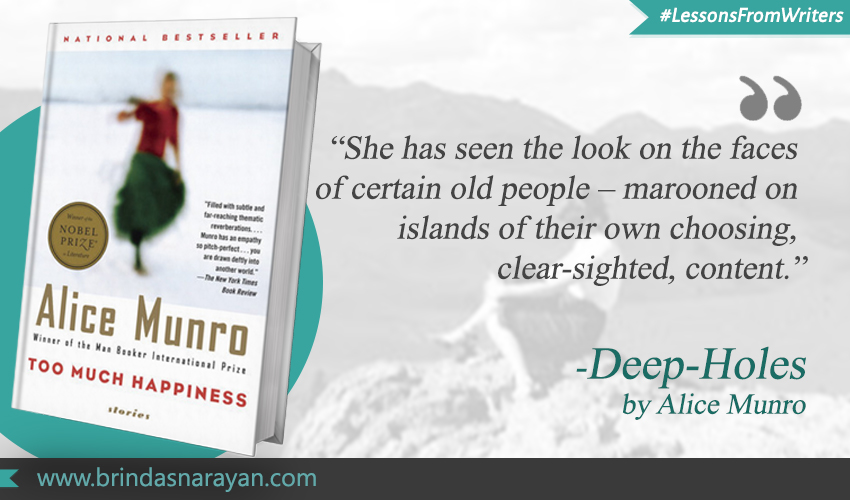
Lessons From Writers: Engaging with Alice Munro’s Genius
I don’t remember when I first read a story by Alice Munro. I don’t remember which year it was, or even where I was, while reading it – at our apartment in Domlur, inside the British Council Library, or at an outdoor Barista? And this perhaps is the nature of such memories, where the edges are blunted, the details blurred, but a sense remains of having experienced something shocking and acute, as vivid as a jolt of electricity from a sagging wire.
That’s how I recall that moment, when I finished the story and felt shaken, that someone, a breathing, living person, could pack such density, such a concrete knowing of what it feels like to be a woman (or a young girl) who is flung hither-thither, like we all are, at times, by life’s vagaries. My strong identification with her characters is surprising for another reason: Munro’s stories are set in a remote town in Canada, in a setting that is distinctly unlike Bangalore/Bengaluru – the rapidly swelling, constantly pulsating South Indian city that I inhabit. Yet the thoughts and feelings of her characters can be felt by anyone anywhere. By anyone who has fallen in love, been divorced, bewildered, molested, stigmatized, ostracized, betrayed – the whole gamut of what it means to be vulnerable, fragile or powerless.
There are surprises, no doubt, twists and bends, but hardly of the O’ Henry variety. In Munro’s pages, it’s as if real human beings, and fetchingly ordinary ones at that – store clerks, bookkeepers, nurses, baby-sitters, college professors – have collided with you inside a train’s compartment or longish bus ride, and decided to spill their secrets and concerns. Since I am still on a post-Covid re-reading binge, I decided to revisit Munro, with the adulation of a reader, and the jitters of a writer, who can never approach such immensity or sagaciousness in my own writing.
To give those of you who haven’t dipped into Munro yet, an idea of what this might feel like, let’s take Deep-Holes, one of the stories in her collection Too Much Happiness. Starting with the title: Deep-Holes. Knowing Munro, the hyphen between two normally distinct words is surely an intentional act. That then triggers a question: why are these words bridged together, however tenuously? Are we as readers, supposed to teeter on that punctuation mark, wondering if life – like the story that unfolds – is a vacuous ‘hole’, with no depth (or meaning) whatsoever?
The series of events that stitches up this story starts out with a banal event: a Mom (Sally) packing a picnic basket. All this with an infant in tow and two raucous boys to manage. And a geologist husband, who veers between a disgust for human messiness (the sight of his wife feeding their baby daughter repels him) and an academic enchantment with the planet that birthed all this. The picnic terrain is marked by perilous craters and steep drop-offs. As readers, we can already anticipate a crash or accident. After all, like Chekov, Munro wouldn’t pointlessly picturize a place unless it’s going to impact her characters in a peculiar manner.
One boy (Kent) falls, shatters his leg, marking him out for life with a permanent limp. During an in-between interlude, which seems strangely like a joyful me-time for the Mom, she tells her hospitalized son that she secretly yearns to disappear into unknown islands.
Having already described the Canadian terrain with a geologist’s precision and understanding, Munro leaps from that cratered space, and the accident it engendered, into the future, when the family has to contend with a different kind of hole. A missing son. The boy who had fallen distances himself from his family, and vanishes into a traceless existence. He dispatches the occasional letter – which sounds high-strung, new-agey, exuding an aggravating Hare Krishna kind of cheeriness – that flusters his parents. His father thinks he’s on drugs, or involved in sexual adventures.
But the story is not really about the father, who dies after checking himself into a hospital. It’s about the Mom, the quiet domestic spaces that she’s forced to inhabit, and the large seething emotions, she’s compelled to rein in. Later, when she meets her estranged son – who has changed his name to Jonah – she has to contend with the less-than-ideal rapport with the stranger.
There’s a cultural and psychological distance between mother and son, a gap as yawning as the crater he once fell into. It ends with the kind of hopeful contentment that many women have to deal with – the willingness to inhabit an island that is uniquely of their own making. To abide with their own subjective consciousness, or “deep-hole” – yoked as they often still are, to dead husbands and grown-up children.
References
Alice Munro, “Deep-Holes” in Too Much Happiness, Chatto & Windus (Random House), London, 2009




